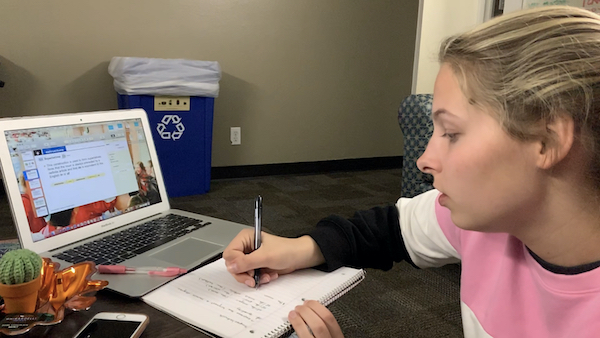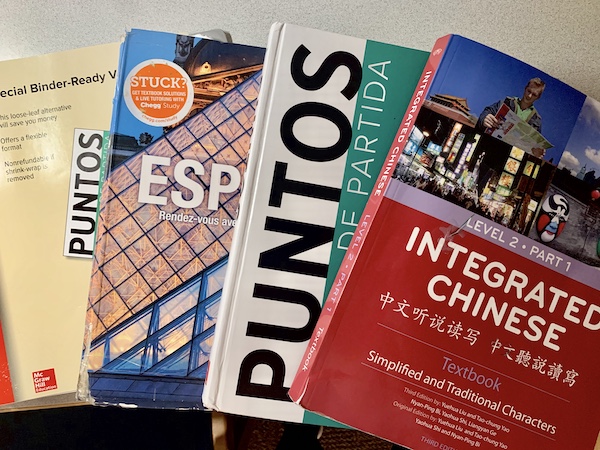
Hello. Hola. Bonjour. Ciao. Hallo. 你好。こんにちは.
Pepperdine officials have long valued international culture and languages, embedding a foreign language requirement into the General Education curriculum and into International Programs. However, a Pepp Post poll of 52 students found that few students valued studying a language beyond the GE requirement or believed they got to a sufficient level after completing 251.
Brooke Romine, a freshman political science and economics double major, said she would choose not to enroll in a language class.
“I have always wanted to learn another language and I have been trying to learn Spanish for a really long time, but I’ve come to the conclusion that language learning is just not a skill that I have,” Romine said.
Pepperdine language professors believe the General Education language requirement helps students attain and acquire a functional competency in listening, speaking, reading and writing in their choice of a foreign language.
“It is hard to imagine an educated person without command of another language,” said Michael Sugimoto, professor of Asian studies and interim dean of International Studies and Languages.
Undergraduate students and professors have differentiating opinions regarding this requirement, debating the benefits of learning a second language, the most profitable language for students to learn and the limitations of a classroom environment.
Some students are reluctant to take language classes
The poll shows that 70% of students will reach/have reached the 251 level, 14% will reach/have reached 252 and 16% will reach/have reached directed studies.
Some 64% said they would not have enrolled in a foreign language class if it was not required as a GE.
Furthermore, 44% of students chose the language they are studying at Pepperdine because of previous experience and 48% of students chose the language that matches their International Program location. Only 2% of students chose a language based on pure interest.
Pamela Lim, a junior business administration major, also wouldn’t take a language class if it wasn’t required.
“I think if I really wanted to learn another language I could self-learn,” said Lim, who speaks three already.

Some students know multiple languages
The poll found that many students wish they could speak another language and roughly 39% wished they spoke several more languages.
“The United States lags behind most nations of the world in the percentage of its citizens who have some knowledge of a second language,” according to the American Academy of Arts & Sciences’ Commission of Language Learning.
Some 32% of students polled already speak fluently in more than one language, but most only spoke one.
Junior sociology major Kau’i Aguiar is fluent in English and Hawaiian pigeon and conversational in Mandarin. She studied abroad in Shanghai for an academic year without having any previous experience in Mandarin.
Although Aguiar and many other Pepperdine students know more than one language, she thinks America is falling behind other countries when it comes to providing opportunities for learning a second language beginning at a young age.
“For lack of a better term, the U.S. has ‘linguist-centric’ ideas,” Aguiar said.
Lim, who grew up in Malaysia, is strongest in English, fluent in speaking Chinese, and proficient in Malay.
Pepperdine offers a variety of language placement exams to students who have had previous experiences with a second language. These exams are used to determine which level students should enroll in or decide if students’ language abilities surpass the GE requirement.
These exams are not limited to the languages that the university offers. Professors who speak Korean or Tagalog may proctor additional “unofficial” placement exams.
Benefits of learning a second language
The benefits of learning a foreign language and bilingualism include higher cognitive reserve in advanced age, enhancement of cognitive flexibility, and delay in the onset of dementia, according to an analysis published in the 2018 Foreign Language Annals.
Multiple language professors at Pepperdine said knowing a second language is beneficial in the workforce. Employers prefer candidates with language skills, who get higher paying starting jobs and more promotions.
“It is also considered to be more respectful in certain fields like social work and psychology to speak your client’s language,” said Kelle Marshall, associate professor of French studies and French studies program coordinator.
David Dowdey, professor of German language and literature, believes interviews are key to evaluating a person’s language abilities.
“What students have [proficiency level] don’t come up until they’re being interviewed,” Dowdey said.
Furthermore, Dowdey said learning another language broadens a person’s worldview and perspective, increasing understanding and appreciation of the culture.
“Conflict arises because of ignorance,” Dowdey said.
Aguiar’s opinion agrees with Dowdey’s.
“I think you perpetuate culture with whatever language that you’re speaking,” Aguiar said.
Sugimoto thinks knowing multiple languages is a win-win, especially since professional realms are overlapping.
Most profitable language for graduates to learn
The most profitable language varies depending on the student’s career plans for the future.
Spanish and French are most profitable for business conducted in North America; French and German in Europe; Polish and Russian in Eastern Europe, and Mandarin and Japanese are critical languages in Asia, Marshall said.
English is the most spoken language in the world, according to data from the 22nd edition of Ethnologue ranks. The top 10 most spoken languages are ranked as follows: English, Mandarin Chinese, Hindi, Spanish, French, standard Arabic, Russian, Portuguese and Indonesian.
As a business major with personal living experiences in southeast Asia, Lim thinks Chinese is the most valuable language to learn and know.
Victoria Levinsohn, a junior international studies management and Hispanic studies double major, thinks Spanish is the most valuable.
“There is a large Spanish speaking influence and population in the U.S. and growing around the world,” Levinsohn said.
Learning language solely in a classroom setting
The poll found that 74% of students do not think it is possible to learn a second language simply within a classroom setting.
Dowdey believes it is highly unlikely to reach the native-speaking level if the student only started the language in college. He also emphasized that native-speaking level is extremely hard to reach and it is not equivalent to reaching fluency, which is lower.
Marshall, however, has personal experience learning and mastering a second language in the classroom setting.
The university bases 251 language proficiency upon guidelines from the American Council on the Teaching of Foreign Languages. Speakers at the 251 intermediate level have the ability to use the language to talk about their daily life and other familiar topics. Writers are able to craft simple messages, request information and primarily write in present tense, according to ACTFL.
Listeners at this level can understand information that is simple and contains high-frequency vocabulary. Intermediate-level readers can understand texts that convey basic information with predictable patterns.
“The classroom setting is not sufficient to master a language,” Dowdey said. “You need to be in a country where the language is spoken on a daily basis.”
Paul Begin, professor of Hispanic studies and interim associate dean of curriculum and General Education, thinks the level students can truly get to depends on the students themselves.
Romine expected the introductory level classes she is currently in to be simpler and focus more on the basic communication skills. However, she thinks the classes are more grammar heavy.
Junior communication major Daniela Singleterry had expectations of being able to hold a conversation in Italian after completing the 251 level. She was able to achieve this through lots of practice during her time studying abroad in Florence.
Aguiar assumed she would be fluent in Mandarin after completing her year of studying abroad. Although she retained more because of her abroad experience, she is only conversational.
Levinsohn thought the 252 level in Spanish was below her expectations in terms of difficulty.
“It felt like a high school class,” Levinsohn said.
Levinsohn also believed her abroad classes taught by native speakers within the cultural setting in Buenos Aires made a huge difference.
“Being abroad was much more helpful for my language abilities than learning it in the U.S.,” Levinsohn said. “The experience was better for retention because Spanish was spoken every day.”
Beverly Hsu completed the reporting for this story under the supervision of Dr. Christina Littlefield and Dr. Theresa de los Santos in Jour 241 in spring 2020. Dr. Littlefield supervised the web story. Dr. de los Santos supervised the video package.




